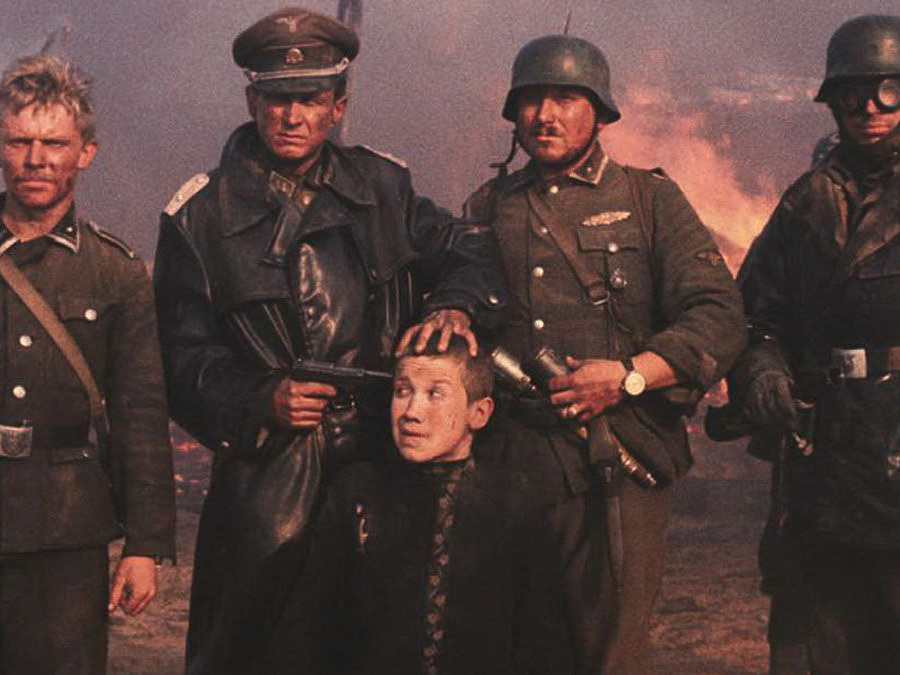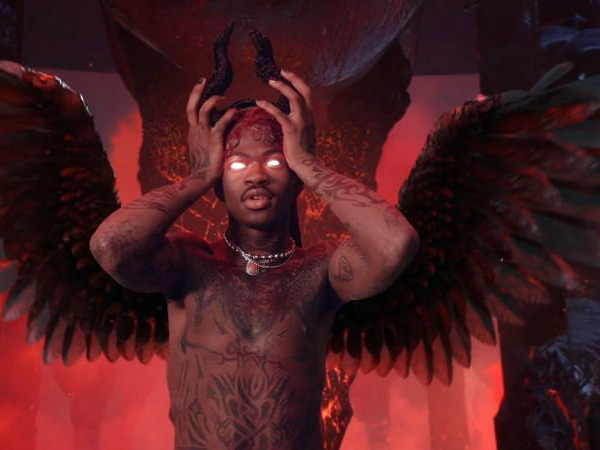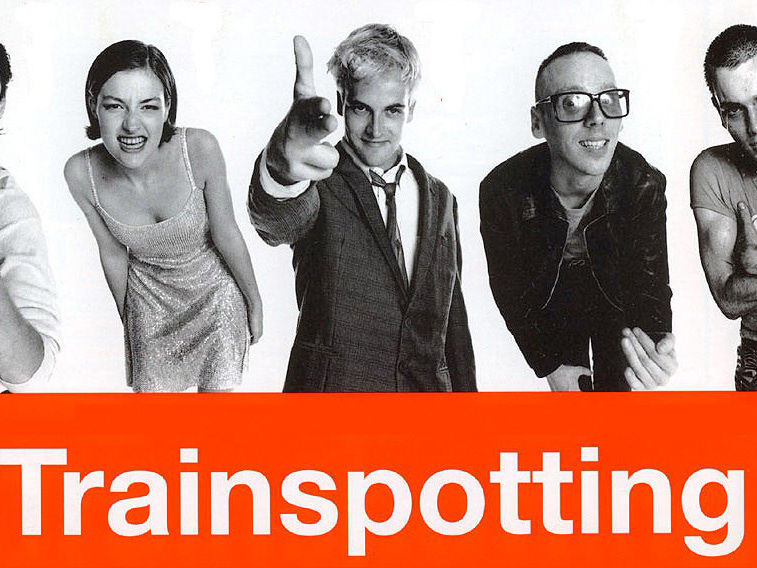Taika Waititi's "Jojo Rabbit" Movie Poster
Term Paper II:
Is Jojo Rabbit a “Good” Holocaust Film?
Introduction
Throughout this course, we have learned about an evaluated a wide variety of Holocaust related films; from respected Hollywood renditions, to Art House style films and Naziploitation as well. This film that will be discussed later in this paper, Jojo Rabbit (2019), could be considered a mixture of the aforementioned genres. It was directed by Taika Waititi, who is now a popular name in the film industry due to his blockbuster Thor: Ragnarok (2017)1, therefore there are a few Hollywood elements in the film. He is different from the typical blockbuster director though, at least in the case of this film. For, although he did attempt to play with the audience’s emotions and it did indeed have a relatively happy ending, he did have a distinct visual and artistic style, good dialogue that accurately, or rather, believably fit each character, and put clever hints about each character throughout the film as well. There were a few things that could have been improved, but overall it was a solid film. The question that remains is how does it compare to other holocaust films? And should it even be consisderd a Holocaust film?
Summary
The film starts with the main character, an 11 year old boy named Jojo, rehearsing his Nazi mantra/rules before his first offical day of his weekend long Hitler Youth training camp with an imaginary Hitler beside him. We are intriduced almost immeadtly to the fact that his imaginary friend is Hitler, who helps to reinstate his Nazi conditoning on a regular basis. The opening scenes are very saturated and have sharp cuts throughout. The audience can tell that the film will be, at least primarily, shown through Jojo’s perspective and therefore, for the majority of the film, we only see what he sees.
Once he arrives to the training camp, he is introduced to “Captain K,” who is later hinted at being homosexual; seeing as the Nazi’s did not agree with homosexuality and he was a Nazi officer, he tried to be secretive about it and likewise the movie never outwardly said it either. The children then were separated by sex, the girls learned how to tend woulds and other more docile tasks, whereas the boys were taught battlefeild techniques. All of the children were taught anti-semestic rhetoric through “Der Jude,” 2 which is a recurring topic in the film, and participated in book burning as well. Throughout all of this, Jojo at first looks confused, like he’s unsure if he should be taking part in these activities, but ultimately does it anyway and seemingly has fun while doing them.
The next day at the summer camp shows the audience that although Jojo thinks that he genuinely and wholeheartedly thinks like a Nazi a believes their teachings, he doesn’t have the heart to actually act any of their teacheings out. On this day, the children were being supervised by some teenage mentors instead of by the general, and one of them could tell that Jojo wasn’t as “tough” as the other kids, so he singled him out. The teenager grabbed a rabbit, held it up to Jojo’s face and told him to kill it. He stood there looking shocked, contemplating over whether or not he should, or rather could, do it.
Meanwhile, the other mentors and his peers all begin chanting “Kill! Kill! Kill!”2 And of course he is not able to do it, so the mentor snaps the rabbit’s neck then states that “[Jojo is] a coward, just like [his] father” and that “[he is] scared just like a rabbit,” then suggested that, “maybe [they] should snap [his] neck too.”2 Again, the kids begin to chant, but this time they chant his new nickname, Jojo Rabbit. Due to this shot at his confidence, he runs off further into the forest to cry, but then he has a chat with “Hitler” where he tells him to embrace the nickname and “be the rabbit.”2 Because of this new found confidence, he charges back to camp where the boys are beginning to learn how to use grenades. The very dramatically grabs one out of Captain K’s hand, pulls the string and throws it, just for it to bounce off of a tree, land right in front of him and explode. He doesn’t die, but is left with a multitude of scars and moved to the Berlin Nazi headquarters where he is tasked with hanging up propaganda. At this point in the film, it is still seemingly a fun movie told from the perspective of a child. But things begin to change in the second act.
This is when we learn that his mother disagrees with the Nazi regime and is a member of the revolution and that she is hiding a young Jewish girl in their attic.Their first few interactions are bad, because he is brainwashed and she knows that so she plays along with it. Upon their first interaction, ominous string music would play every time she appeared on screen, much like a horror film. They also Parody Twilight (2008) in this scene: Jojo asked, “What are you?” to which she replied, “You know what I am, say it!” and he, again dramatically, say “a Jew!” 2 She aslo tells him that he is, “not a Nazi, [he is] just an 11 year old kid who wants to dress up and be part of a club.”2 This discovery caused conflict between hi and his mother because, although she wasn’t aware that he knew about the girl, he bagan to treat her differently because he realized that she wasn’t loyal to the Nazi regime like he was, but his mother handles it very well.
In the third act, the tone of the film completely changes. At this point, he and the Jewish girl, Elsa, were well acquainted. But one day when Jojo is outside hanging up propaganda, he followed a butterfly up to the town square where revolutionaries are hung. He didn’t realize anything was array at first until he noticed his mother’s shoes and then looked up to see the rest of her body. He gripped her tightly and sobbed. When he got back home, he stabbed Elsa in a fit of grief, but the knife was small and blunt so it didn’t do much. She could tell he was distraught so she didn’t hold it against him. Then the war was coming to an end and a battle was going down in Berlin. Jojo witnessed immense death and couldn’t really take it.
Since he was wearing a Nazi jacket, an American officer grabbed him and shoved him to an area with other captured Nazi’s. While there he encountered Captain K who said a few last words to him then briskly removed the jacket and shoved him away yelling anti-Semitic things at him so that the American solders would pay attention to him and let Jojo go free. At this point Berlin was completely occupied by the Americans, but when he returned home, he lied to Elsa about it, sugesting that the Nazi's won. This was, presumably, because he thought that if she realized she was free, she would choose to leave him and he would be left with no one. Eventually, she convinced him to go outside and while there she saw Americans drive by and realized that Germany did not win the war. At first she was mad at Jojo, but then her anger dissipated and they danced on the sidewalk.
Film Analysis
This film has primarily positive reviews with a 79% overall rating on Rotten Tomatoes, an 8.1/10 on IMDB and a 3.5/4 on the Washington Post, but some critics, such as Richard Brody from The New Yorker, thought although the film was fine, the overall premise was cliche. Brody states, “Nazis are easy targets; Hitler and his cronies need little satirizing” and that “making fun of Hitler and his minions is both easy and pointless, because he poses no threat [today, therefore,] Waititi is kicking a dead bull.”3 He argues that directors should be satirizing members of current administations instead of past ones. Although that is a relatively valid viewpoint, we discussed a similar view in class, but to say that for this film is missing the point of it. It is not necessarily simply making fun of Nazi’s, it is instead using them as an extreme example of what our society today could be like if we continue down our regressive path. Ann Hornaday says it best in her article for the Washington Post, she states:
“Waititi tiptoes [a] fine line...deflating his most toxic characters with ridicule, but never making them merely fatuous or ignoring the shattering consequences of their beliefs. The horrors that Jojo applauds so enthusiastically aren’t any less grievous for being refracted through his imagination If anything, that conceit underlines the cynicism of the forces that have capitalized on his naivete.”4
In short, the film does a great job at showing how ridiculous the beliefs of the Nazi characters in the film are and how detrimental their practices were towards the youth. Jojo was so conditioned that the had the furir as an imaginary friend who reinstated his beliefs, and when he began to waver in those beliefs, imaginary Hitler got unreasonably angry with him and was somewhat threatening even to the viewer. That shows how strong their brainwashing was that a child had to have so much cognitive dissonance and internal dysphoria that he needed an imaginary figurehead to justify his beliefs. And it makes the viewer think about how much worse it must have been for the other kid who didn’t waver in their beliefs and also lost their parents then had to deal with the aftermath once the war was over. They had to recondition themselves on their own, especially since the Holocaust was a topic that no one wanted to talk about as we saw from the films Shoah (1985) and The Nasty Girl (1990).
Historical Context
There is a history of satirical and art house films focused on the Holocaust being controversial. Some historians and film critics alike question whether or not it is appropriate to create fictional scenarios based off of the real occurrences of the Holocaust. In some cases, like with Nazisplotaion films, it is an accurate critique seeing as those films stray so far from the truth and simply use the horrific event just to have easy antagonists. But with more “respectable” films, that question is more difficult to answer. Films such as Schindler’s List (1993) are respected for being “deep” and “thought-provoking” but are also viewed as cheap attempts to make money and gain awards. One the other hand, films such as The Nasty Girl (1990) are relatively historically accurate, and do try to account for real things that occurred during and after the Holocaust. This film lands somewhere in between. Jojo is not a real person, nor is Elsa or any of the other main characters, even the Hitler in the film wasn’t a rendition of the real Hitler. Yet, the Hitler Youth was indeed real and children were indeed conditioned into believing their hateful teachings, whether or not the adults themselves even believed it. And to top it all off, this film is technically a comedy and to some, a comedic film about the Holocaust is blasphemous. Which is discussed in Susan Linville’s article, where she states that “no narrative in inherently comedic” and an important remark she made that relates to all Holocaust films was, “it wasn’t the best people who survived, nor did the best ones die, it was random!”5 That last quote is something I think many Holocaust film don’t touch on enough, the deaths that occurred were primarily random, yet do you rarely ever see the main character of the film killed. Jojo didn’t necessarily do a good job of showing that either, his mother’s death wasn’t entirely random, it was because of her affiliation with the resistance. Lastly, a quote from an article by Jaye Berman Montresor really diminishes any historical critique about satirical film not being realistic, it isn’t meant to be, instead it is “ anesthetic’ hallucination of reality.”6
Conclusion
In conclusion, is Jojo Rabbit truly a Holocasut film? I believe that it is, due to the information from both the critics and articles listed above in addition to my own interpretation. It accuratly shows how children were conditioned during the Nazi era and how revolutionaries were treated as well. There were very few flaws with the film as a whole because although it was primarily comedic, it was also immensely serious at times as well. It did not showcase the Jewish experience that much but the majority of Holocasut films do. We rarely see this event through the eyes of a child, that is something I think this film accomplished.
1.Jojo Rabbit, IMDB, 2. Jojo Rabbit, Film, 3.Richard Brody, The New Yorker, 4. Ann Hornaday, Washington Post, 5. Susan E Linville, 6. Jaye Berman Montresor
Bibliography
Brody, Richard. “Springtime for Nazis: How the Satire of ‘Jojo Rabbit’ Backfires.” The New Yorker. The New Yorker, October 22, 2019. https://www.newyorker.com/culture/the-front-row/springtime-for-nazis-how-the-satire-of-jojo-rabbit-backfires.
Hornaday, Ann. “A Comedy about Nazis That's Actually Funny? Yes. But 'Jojo Rabbit' Is Also Deadly Serious.” The Washington Post. WP Company, October 23, 2019. https://www.washingtonpost.com/goingoutguide/movies/a-comedy-about-nazis-thats-actually-funny-yes-but-jojo-rabbit-is-also-deadly-serious/2019/10/23/9847e6d0-f113-11e9-89eb-ec56cd414732_story.html?arc404=true.
Jojo Rabbit. Directed by Taika Waititi. TSG Entertainment, 2019. Film. 1 hr., 48 min.
Linville, Susan E. "Agnieszka Holland's "Europa, Europa": Deconstructive Humor in a Holocaust Film." Film Criticism 19, no. 3 (1995): 44-53. http://www.jstor.org/stable/44075821.
Montresor, Jaye Berman. "Parodic Laughter and the Holocaust." Studies in American Jewish Literature (1981-) 12 (1993): 126-33. http://www.jstor.org/stable/41206185.
Waititi, Taika. “Jojo Rabbit.” IMDb. IMDb.com, October 24, 2019. https://www.imdb.com/title/tt2584384/.









